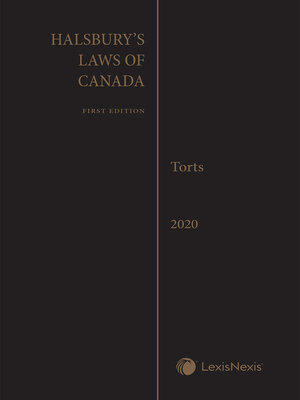Halsbury's Laws of Canada: Torts (2024 Reissue)
ebook ∣ Volume 1 · Halsbury's Laws of Canada: Torts (2024 Reissue)(1)
By Bruce Feldthusen

Sign up to save your library
With an OverDrive account, you can save your favorite libraries for at-a-glance information about availability. Find out more about OverDrive accounts.
Find this title in Libby, the library reading app by OverDrive.



Search for a digital library with this title
Title found at these libraries:
| Library Name | Distance |
|---|---|
| Loading... |
The law of torts hovers over virtually every activity of modern society. No enterprise, action or profession is beyond its potential scope. Because of this, tort law is of real concern to most legal practitioners, jurists and academics. With respect to negligence, accidents happen every day and can then require the determination of several legal issues. Virtually no area of practice is untouched by the implications of negligence law, because questions of standard of care and causation arise in every aspect of human endeavour, and inevitably make their way for resolution into law offices across Canada.
Newly revised and thoroughly updated, Halsbury's Torts (2020 Reissue) enumerates, defines and explains the application of the law in Canada relating to civil wrongs. From negligence to intentional torts, strict liability, nuisance, occupier's liability, product liability, Québec's law of delict and limitation of actions, this valuable volume provides a black-letter narrative of the law for everyone seeking a straightforward understanding of the subject.
Topics in this essential national reference include:
- Intentional conduct
- Specific torts
- Defences
- Damages
- Requirement of damage
- Limitation periods
- Multiple causes of action
- Causation
- Onus of proof, inferences and material contribution
- Multiple causes
- Defining the parameters of the "reasonable person"
- Unreasonable risk
- Likelihood and severity of harm
- Reason for taking risk
- Cost of avoiding risk
- Factors affecting the appropriate standard to be applied
- Age
- Mental illness
- Gross negligence
- Custom
- Establishing custom
- Causation
- Significance
- Medical custom as reasonable care
- Failure to follow custom
- Statutory violations
- Application to specific professions
- Neighbour principle
- Recognizing new duties
- Determining whether duty is novel
- Foresight and proximity
- Policy reasons for denying duty
- Failure to act
- Unforeseeable plaintiff
- Burden of proof
- Inferring negligent conduct
- Inferring responsibility of defendant
- Trespass and inevitable accident
- Thin-skull plaintiff
- Rescue attempts
- Intervening acts
- Policy vs. operational decisions
- Restated Anns test
- Standard of care and causation
- Misfeasance in public office
- Contributory negligence
- Voluntary assumption of risk
- Illegal conduct
- Scope of Rylands v. Fletcher
- Defences
- Vicarious liability
- Public and private nuisance
- Statutory and common law defences
- Remedies
- Trespassers, licensees, invitees and contractual entrants
- Legislative framework in various jurisdictions
- Contract theory
- Negligence theory
- Proof
- Defences
- Class actions
- Requirements
- Capacity
- Fault
- Injury or harm
- Causation
- Vicarious liability
- Liability for harm caused by things in one's custody







